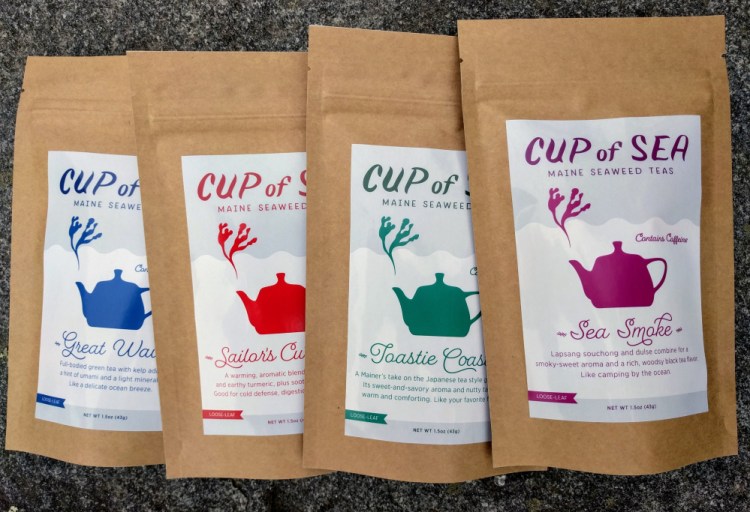When Josh Rogers was growing up in Auburn, he snacked on dulse, a type of seaweed, the way other kids ate potato chips. “It was something none of my classmates knew about,” he said. “Everyone thought it was weird.”
Rogers picked up the taste for seaweed from his great-grandparents, who moved to Maine from New Brunswick (where eating seaweed was popular) in the 1930s to work in the Lewiston mills. Every summer, when the family went back to St. Stephen, New Brunswick, they’d stock up.
In the 1990s, edible seaweed started showing up here, usually in health food stores. Now it’s everywhere: “A lot of people don’t think it’s weird anymore,” Rogers said.
A few years ago, when Rogers was living in New York and missing Maine, he began ordering seaweed online. One day at work, he was enjoying his daily green tea when he realized it tasted a lot like the kelp he’d been cooking with. “I started thinking about it, and I said ‘You know, there should be seaweed tea.'”
When Rogers and his wife moved back to Maine, he experimented with different seaweeds and steeping times. He started offering tastings at farmers markets and health food stores, tweaking his recipes as he got feedback. The result was “Cup of Sea,” a new line of seaweed teas.
He now makes four varieties, sold as loose leaf tea in 1.5-ounce bags for $9-12, depending on where you buy them. “Great Wave” is a blend of green tea and kelp that is meant to taste like green tea, but has enough seaweed in it to make you feel like you’re at the beach. If you’re not a fan of the odor and taste of seaweed and are only interested in it for its purported health benefits, no worries – this tea does not overwhelm your senses.
“Sea Smoke” is a blend of lapsang souchong tea and smoked dulse, and it’s Rogers’ favorite: “It tastes like camping by the ocean,” he said. “I love it with milk.”
“Toastie Coastie” is a mix of toasted rice and kelp, and contains no caffeine. It’s meant to mimic genmaicha, a Japanese tea made with roasted brown rice.
“Sailor’s Cure-All” is a blend of ginger, turmeric and bladderwrack, ingredients that Rogers said aid digestion and are anti-inflammatory.
“I want more people to consume seaweeds,” he said. “The seaweed industry is really on an upward trend, and it needs to be because the world is getting close to maxing out our use of land-based agriculture. One of the awesome things about seaweed is, if you do it right, it’s extremely sustainable.”
Rogers’ teas are on the menu and shelves at Arabica and Dobra Tea, in Portland. They are on the shelves at Lois’ Natural Marketplace stores in both Portland and Scarborough, and Loyal Citizen in Portland. He also sells them online at cupofsea.me.
On June 2, Rogers is offering tastes of his teas at the Lois’ on India Street from noon to 3 p.m.
Send questions/comments to the editors.



